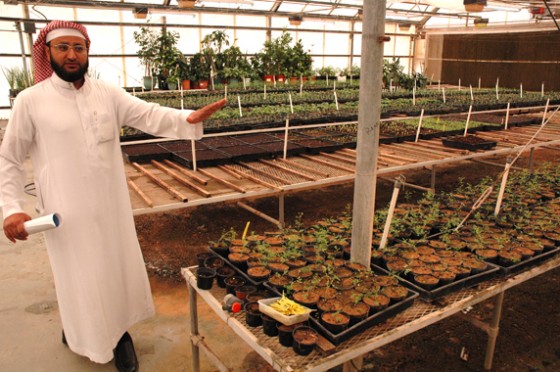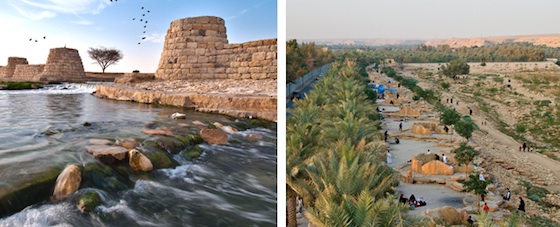 For hundreds of years, Saudi’s Wadi Hanifah River carved out a scenic valley extending from sand dunes and agricultural land pocked with date plantations into the heart of Riyadh before it seeped underground. But the city’s expansion into a thumping metropolis of 7 million people brought the 4500 sq km catchment area close to extinction as sewage and construction waste was dumped in the river.
For hundreds of years, Saudi’s Wadi Hanifah River carved out a scenic valley extending from sand dunes and agricultural land pocked with date plantations into the heart of Riyadh before it seeped underground. But the city’s expansion into a thumping metropolis of 7 million people brought the 4500 sq km catchment area close to extinction as sewage and construction waste was dumped in the river.
As a result, the Arriyadh Development Authority commissioned the Canadian architecture and planning firm Moriyama & Teshima and Buro Happold – a UK engineering firm – to submit a Master Plan and Restoration Program to restore the area’s ecological health. One decade later and the Wadi is once again a thriving desert oasis.
This massive reclamation project involved various stages. First it was necessary to clean up the river waste, which involved removing 1.5 million cubic meters of debris ranging from construction waste to dead animals.
The riverbed hand to be cleared and a nearby tannery that was releasing toxic chemicals into the river was shut down.
Water mains, sewage lines, and even overhead power lines were relocated, and stone walls were erected to demarcate the boundaries between public and private land.
Meanwhile, 35,000 indigenous shade trees were cultivated in greenhouses along with native grasses. Although the local people resisted the re-introduction of these species, believing them to be weeds, the design team prevailed by creating 150 shaped clusters of plants that were actually very beautiful.
Using native species to re-vegetate the wadi was essential for two reasons: first, they have adapted to extreme weather conditions such as low rainfall (just 100mm a year) and high temperatures, and they have provided flood control for centuries. Prone to flooding, the wadi could no longer cope as asphalt replaced wetland plants that can retain moisture and sediment.

These clusters were placed along a 70km stretch of the river, which is now accessible by a new 53km road that provides links to 6 new parks! There are also 43km of promenades and walkways that allow local people to hike, bike or stroll along the new rehabilitated and verdant urban oasis.
Perhaps the most impressive aspect of the project to date, which is expected to continue for at least 100 hundred years as other sick watersheds (including within Mecca and Medina) receive similar treatment, is the bio-remediation of the sewage plant that has re-introduced treated water into the river system.
Using a constructed wetland system, the team introduced four powerful air pumps that blast dissolved oxygen into the treatment plant, which destroys existing bacteria. Then they added a layered textile mat, where algae and other micro-organisms proliferate, digesting any particulates. Then a series of tilapia feed on the algae so that the water is almost 100% clean and clear when it comes out.
This treated wastewater is so clean and free of odor that it has been allowed to continue along the river and forms the basis of an additional 28km of green parks.
 If you’re interested to learn more about the project, which is even more impressive than we’ve been able to express, please visit the MT Planners website.
If you’re interested to learn more about the project, which is even more impressive than we’ve been able to express, please visit the MT Planners website.
Images via Arriyadh Development Authority
More on Greening Saudi:
Saudi Could Export Solar for the Next 20 Centuries
The Red Sea is Filled With Tiny Researchers Saudi is Intent to Discover



Double standards. While Saudis re-claim their rivers, their developers snatch public natural reserves in Lebanon, and ignore the Lebanese environmentalists asking to preserve these natural landscape.